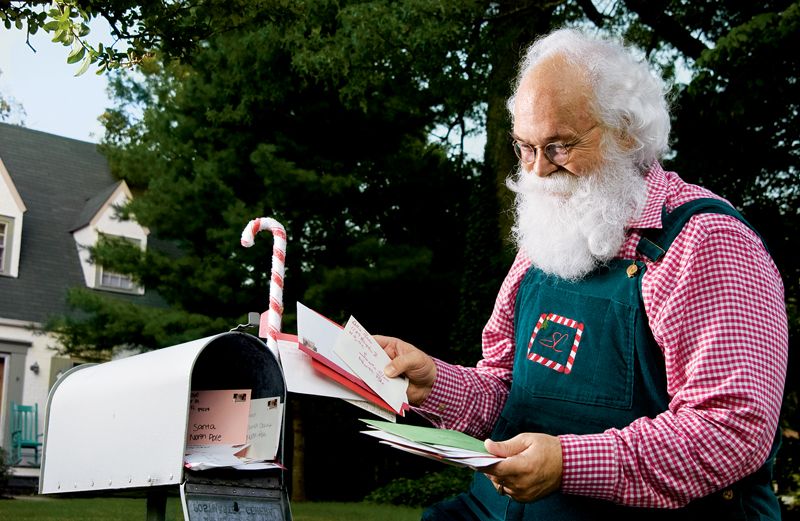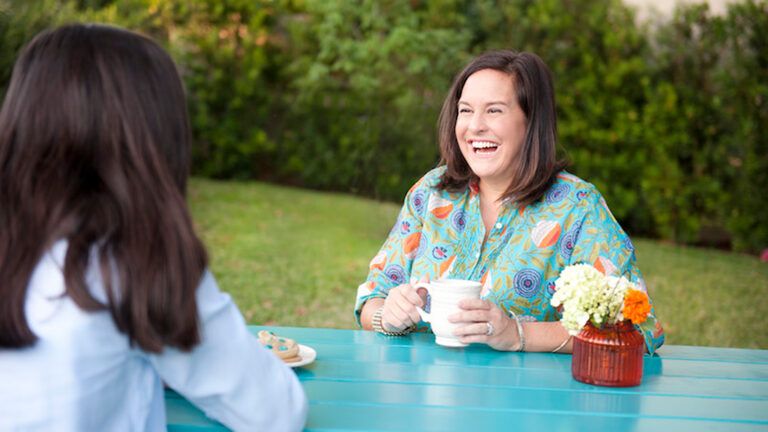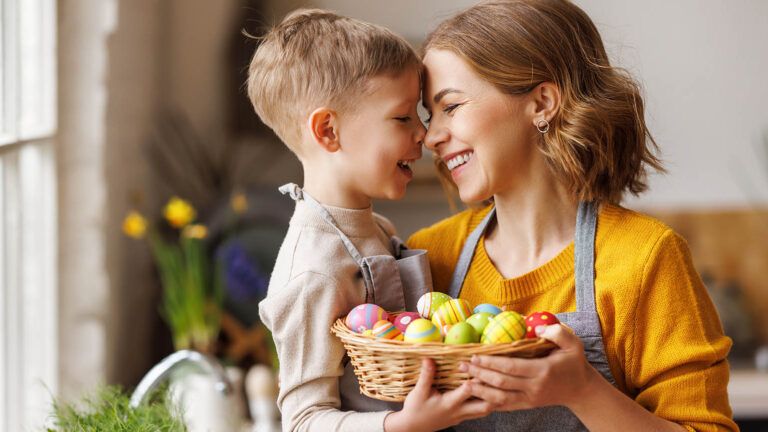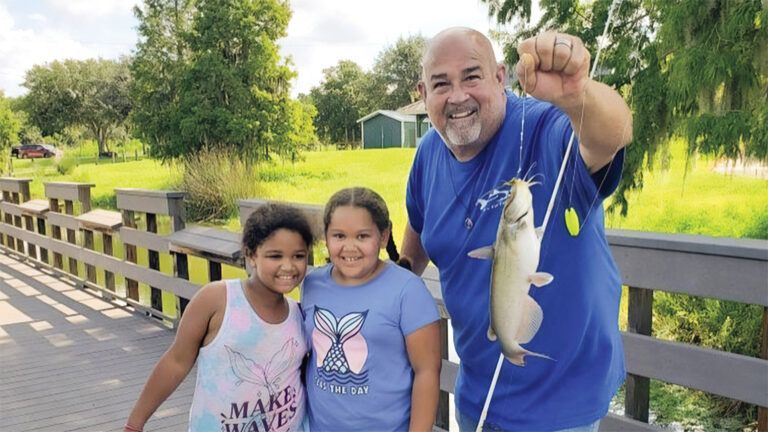Christmas begins early for me.
In the fall I take my red suits out of storage and get them cleaned. Then I start lifting weights and doing crunches. I need to get strong so I can lift kids up on my lap.
By November I bleach the roots in my beard and hair. My hair is a natural gray–what’s left of it, anyway–but to really get it that straight-from-the-North-Pole snowy white, I need a little help.
I get out the little leather-bound book I use for writing down children’s names. But the book, the beard, the fur-trimmed suits, they’re not what make me a real Santa. That comes from something I discovered years ago.
I grew up right here in High Point. I was a shy, overweight kid, the third-string tackle on the football team and third-chair violinist in the orchestra. The kind of guy who was content to stay in the background.
My social life consisted of pizza parties and bowling nights with the church youth group, where I never said much. The one person I really talked to was my father.
Dad was a kind, gentle man who ran the print shop in town. He’d never learned to drive, so he walked everywhere, and some mornings he even walked me to school.
Those mornings were magical. We talked about everything–sports, school, his business, the family. I didn’t need to be Mr. Popular, surrounded by friends, when I had the best friend I could ever dream of–my dad.
Then one Labor Day weekend he rode with my uncle to Camp Lejeune to pick up my cousins who were being discharged from the service. They were hit by an oncoming car. Dad was killed instantly.
I was 15 and determined to be brave and strong for my mother and younger brother. You’ve got to take care of them now, I told myself.
At the funeral service, I held back my tears. It was tough. Afterward, I went back to my routine–football practice, orchestra rehearsal, pizza parties with the Methodist Youth Fellowship.
But I knew life would never be the same. How could it be, without my best friend? Those walks to school were so lonely now, every step a reminder that Dad was no longer at my side.
That December everyone in my youth group was excited about the Christmas party we were putting on for the children at the local mission. The other kids in the group set to making construction paper chains and wrapping presents, but I just sat at the table, not feeling like celebrating.
Our youth leader cornered me. “Cliff, we’ve got a special job for you at the party.” What would I have to do? Lead a game of musical chairs? Play my violin? I didn’t want to be the center of attention when I was barely keeping it together. “We want you to be our Santa this year,” he said.
I couldn’t muster the energy to argue, so I said okay. Maybe our youth leader figured I’d be honored. But I was sure he picked me because I was the fattest kid in the group. Very little padding necessary.
The day of the party I put on the rented red suit and hat, the wig and the fake cotton beard. I pulled the black belt tight around my waist and took a look in the mirror. I could hardly believe what I saw. The awkward 15-year-old was gone.
In his place stood a jolly, smiling, kindly man. A man who reminded me of my father. I tried a quiet, “Ho, ho, ho,” then hoisted the bag of toys onto my shoulder. I was Santa.
It was so easy at the party. I didn’t have to go up to anyone and start a conversation. I sat in front of the Christmas tree, and the kids came to me. My shyness melted away. I felt confident and friendly, like I’d always wished I could be.
After a child told me about what he wanted for Christmas, I said a prayer for him. And with each prayer, each smile I got from a child, my grief receded a little more and Christmas felt more real. Thank you, Lord, for having our youth leader choose me.
Almost every year after that I made sure to be Santa: college parties, my mother-in-law’s Christmas get-together. I went into the printing business, just like Dad, and played Santa at our holiday party. Still, I wondered if there was something more I could do. I wanted to be a great Santa.
Some other Santas told me about the Charles W. Howard Santa Claus School in Midland, Michigan. A Santa school? Who would have thought?
The school was rigorous–only accepting 10 students per year. Classes on proper costumes and makeup and the history of Santa, starting with the real-life Saint Nicholas, who was known for his generosity. Seminars on how to answer children’s questions.
There was even a sleigh with a full team of reindeer so that Santas could practice waving to a crowd at a parade. “I want to go to this school,” I told my wife, Janie.
“Go,” Janie said. “It’s important to you.”
At first I was intimidated. The other student Santas were so convincing with their beards, jolly voices, twinkling eyes. They were naturals. “I’m not sure I’m cut out to do this,” I said to Tom Valent, the dean of the school.
“Cliff,” he said, “here’s the secret. When you get back to your hometown, you are Santa. Just be the best Santa you can be.” Soon enough I’d earned my degree.
Now that I’d learned so much about the figure of Santa, I was able to take my portrayal to the next level. Santa first appears in Clement Clarke Moore’s 1823 poem The Night Before Christmas, but there he’s a “right jolly old elf” in brown and covered in soot.
The big man with the white beard and red suit showed up later, in Civil War-era cartoons by the artist Thomas Nast. I found a Nast sketch of Santa in red-and-white striped pants handing out presents to the Union troops.
I took that picture to a seamstress and had her design a costume just like it. I even got wool fabric from a Gettysburg weaver who made uniforms for Civil War re-enactors.
I designed other costumes too. One in burgundy velvet with reindeer buttons, another with brass buttons with the letters “S.C.” For cold weather I had a couple of capes made, a green one with trim and another made from an old quilt of my grandmother’s (I call it the cape of many colors).
I grew out my beard and discovered that if I bleached it every once in a while, it really did look convincing.
One evening Janie and I were having dinner out when I noticed a little girl staring at me. Finally she came over to our table. “Excuse me, sir, but are you Santa’s brother?” she asked.
“Why, Jessica?” I said. “Do you think I look like Santa?”
Her eyes grew wide. “See,” she said to her parents. “He is Santa! He knows my name.” What neither her parents nor I reminded her was that her name was printed on her hairband.
Every year I play Santa 50 times in a two-month period. I’ve been in parades, shopping malls, photographers’ studios. I listen to hundreds of children tell me what they want for Christmas, their hopes and dreams.
Sometimes they’re shy. “Would you like to be in my book of Good Boys and Girls?” I ask.
I dig in my pocket–I had my seamstress sew it special–and pull out my little leather-bound book. The children come closer and peer at its pages. If their name isn’t there, I write it down in perfect Santa script.
The book isn’t just for them. It’s also for me, because I pray for every child who visits me. That’s the one thing I can give them.
I remember what it’s like to be a kid–how you sometimes feel awkward and lonely. Once I noticed a boy who looked to be about eight, waiting in the back of a crowd until the others had finished. Then he walked up and whispered, “Santa, all I want is for everyone to quit calling me names on the bus.”
I looked at him and could see the boy I’d once been. “I know exactly what you’re going through,” I told him. “What I’m going to do is write your name in my book and when I get home tonight, I’m going to say a prayer for you and ask God to help those children be as nice as you are.”
Sometimes people will tell me, “You know, Jesus is the real reason for the season.” I totally agree. We celebrate the miraculous birth of our savior.
But Santa represents the spirit of giving, and that’s important too, even miraculous sometimes. Because, as I discovered at that youth group Christmas party so many years ago, bringing joy to others brings out the best in you.
Download your FREE ebook, A Prayer for Every Need, by Dr. Norman Vincent Peale





